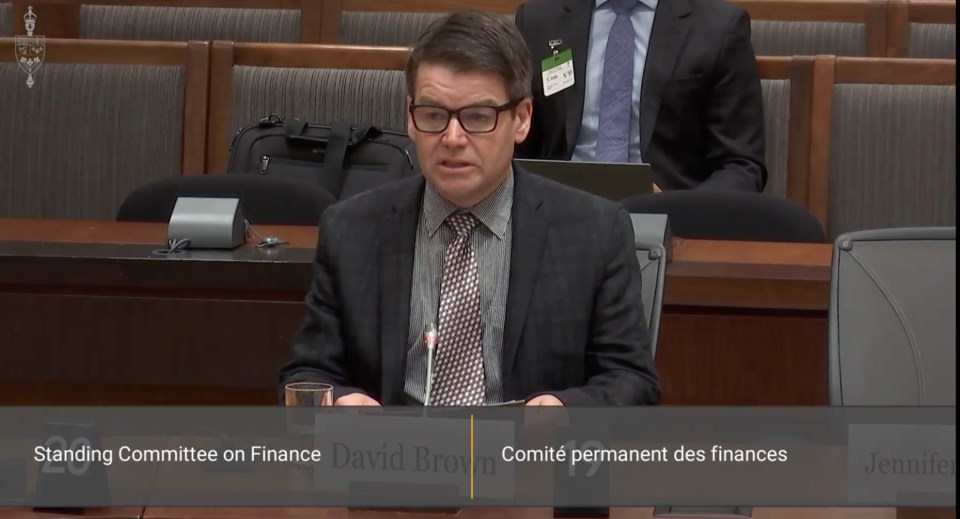A Whistler realtor made the trek to Ottawa recently to formally request the Government of Canada consider an exemption for Whistler in the application of the federal Underused Housing Tax (UHT) on properties zoned for tourism accommodation.
Dave Brown, who was speaking on behalf of the Whistler Real Estate Co. and Tourism Whistler, said at the April 18 finance committee meeting in Ottawa the UHT is driving foreign investors away from Whistler—and the result is not more housing for locals, but less revenue for Whistler, the community, and Canada overall.
The UHT is designed to levy a tax on foreign property owners who do not make their property adequately available for housing. According to Brown, its application to parts of Whistler zoned for tourism accommodation means foreign owners who let their properties be used for tourism accommodation for most of the year may instead sell to Canadians for use as second homes, removing them from the tourist accommodation pool.
“The new federal UHT penalizes those investors who have supported Whistler's tourism economy and contributed to its long-term success,” said Brown, who explained some 80 per cent of Whistler’s tourist accommodations are owned by individuals who use their properties for short periods during the year.
“International owners typically use their property one to two weeks a year, then put it into a rental pool for the remainder of the year so the accommodation is not sitting empty but rather being maximized for its intended tourist rental usage,” he said.
A way around the UHT was to increase usage to at least 28 days per year, but that was a concern for local hoteliers, property managers and commercial business. As Brown explained, owner-accomodation usage doesn’t support the local economy on the same level hotels do.
Brown said a flow-on effect of the UHT was the sale of those properties by foreign owners who didn’t want to pay the tax, or couldn’t increase their usage enough. As such, the units were not becoming housing (as the UHT intended), but were going to Canadian owners who treated them like second homes.
Elaborating on that point after questioning from his own local MP, Patrick Weiler, Brown explained the sale of the properties to Canadians is a bad thing for the local economy because they are zoned for tourism accommodation, and therefore inappropriate for housing, so a Canadian buying them would use the property more as a second home and as a result keep it out of the pool of tourism accommodation for longer periods of time.
“B.C. second-homeowners typically visit on weekends and holidays adding to the busy weekend congestion, whereas international second-homeowners and nightly vacation renters typically support longer stays, filling the needed mid-week periods,” said Brown.
“Instituting the UHT on resort land properties would therefore not add to the local tourist housing stock, not support increased residential usage, but rather, take away from needed tourist accommodation inventory and resort-wide tourism business revenues, while harming Whistler's real-estate industry.”
Pushed by Weiler on whether foreign owners really were selling to avoid the UHT, Brown said he had first- and second-hand knowledge of exactly that happening.
“In fact, [foreign owners] are extremely disheartened, as they were solicited to invest in Whistler and they recognize that Whistler's success is, in part, due to their investments. They believe that Canada is now turning its back on them,” he said.
The properties affected do not make up the majority of Whistler real estate, but they do sit at the heart of the tourism economy at key points within the community—specifically at the base of the mountain and near the golf courses.
According to Brown, there are approximately 6,600 tourist accommodation units on resort lands—of which, approximately 12 per cent are owned by foreigners that would be affected by the UHT.
“For every sale that results in one unit leaving the tourist rental pool to become a B.C. second home, Whistler could stand to lose, on average, 305 unique visitors to Whistler, 788 visitor days, $90,870 in accommodation revenue, $2,726 in MRDT revenue, $7,270 in PST, $4,544 in GST and approximately $280,000 in annual resort spending,” he said.
The complete loss of all that inventory could result in a shortfall of more than $100 million in annual visitor spending, explained Brown.
Speaking to Pique after his presentation, Brown said the reaction was positive.
“When we’ve made our presentation to various departments, they can definitely see where the argument is coming from and the importance of getting an exception for Whistler,” he said.
“It doesn’t make sense for Whistler to have this imposed… it has negative consequences that may not have been thought about when this legislation came into effect.
“We’re turning our back on people that invested in our resort,” Brown added.“It’s not an insignificant change, and I think this just gives Canada a bad reputation, and Whistler a bad reputation as a place to own property.”
The federal budget implementation act is due to be tabled in Ottawa in coming weeks and will include legislative measures that would give effect to the budget. Whether the concerns raised by Brown and the Whistler real estate sector are addressed will be seen then.
Brown’s comments at the April 18 Finance Committee meeting can be read on the federal commons website, here.




